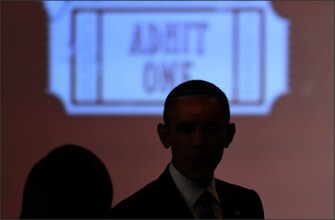
Educators often praise the power of modeling in teaching, as in life; people talk about having role models for a reason. So consider this: What would it mean for students if the President of the United States chose not to accept what’s routinely taught and acknowledged as science?
On Friday, the White House hosted its second annual student film festival. For this year’s festival, President Barack Obama challenged students to make films about community service. The White House chose 15 films to premiere at the March 20th screening.
The White House sorted the finalists into six categories focused on different aspects of community service. One category, “Planetary Champions,” included videos focused on pollution, resource management, and climate change. Here’s one entry:
On Monday, the White House hosted another student event, its annual science fair, where students displayed inventions of all kinds for Obama and some of his chief science advisors.
Both events are chances for the president to push a formal agenda—such as technological investment in classrooms or increased STEM education funding—but there were chances to push an informal agenda, too. In his prepared remarks, including nods to his guests from the scientific community, Obama made subtle and less-than-subtle reminders about climate change:
Subtle:
'That's why we love science. It's more than a school subject, or the periodic table, or the properties of waves. It is an approach to the world, a critical way to understand and explore and engage with the world ... It's a mindset that says we that can use reason and logic and honest inquiry to reach new conclusions and solve big problems.'
Not subtle:
'We have some outstanding guests who are here who've been participating in this on an ongoing basis. Bill Nye, the Science Guy, is here. Signature bowtie. So is Rush Holt, who's one of the few scientists to serve in Congress. We could probably use some more.'
The latter remark alludes to the assertion by many Congressmen that they “are not scientists,” often used as a presage to reiterate skepticism about humankind’s effect on the climate.
Sen. Ted Cruz, R-Texas, who on Monday became the first Republican to declare a formal bid for the presidency in 2016, denies that earth science is a “hard science.” Other likely contenders for the Republican nomination, such as former Florida Gov. Jeb Bush and Sen. Rand Raul, of Kentucky, have either denied man-made climate change or dodged questions about it. (Former President George W. Bush, who didn’t have a great environmental record, nevertheless accepted the human role in climate change.)
I couldn’t help wonder, then, what these kinds of student events would look like if one of these politicians enters the White House—how the then-president’s take on science would translate back to classrooms. How would a teacher address a student who says that climate change isn’t real because the president said so (or has expressed skepticism about it)? Would students’ films be rejected for examining global warming? Would there even be a White House science fair?
It’s unfair to say that students and teachers can’t think for themselves (the filmmakers at the White House festival I attended had as much poise and thoughtfulness as any adult I’ve met), and they don’t need a president to tell them what is and isn’t science. But if a president doesn’t accept findings that are grounded in science, how does that reinforce the idea that STEM—which the country has been pouring money into for years—is so vital to national interests?
Image: President Barack Obama greets people in the East Room of the White House in Washington after speaking at the second-annual White House Student Film Festival. —Susan Walsh/AP
See also:
- President Obama Welcomes Students to White House for 5th Annual Science Fair
- The White House Film Fest: Inspiring Student Voice Through Video (Teaching Toward Tomorrow)